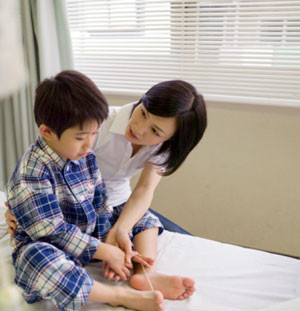Early signs of autism
Autism, also known as pervasive developmental disorders, is one of the disorders that impairs function and hinders life. In the first 2 years of life, children can develop and move relatively normally, then the abilities they have gradually disappear. Parents often take their children to the doctor when they see that their children are slow to speak or have learned to speak but do not respond when called.
 |
| Illustration photo |
Common in children
If parents pay attention, they will notice unusual signs appearing quite early, from when the child is only 10 - 12 months old. The child withdraws into himself, does not care about others, does not like to play with children of the same age and actively avoids these children. Not knowing how to play imitative games, efforts to attract the child's attention are in vain.
The child does not show affection when pampered, cries little, is very well-behaved, even too well-behaved. Has difficulty understanding and using language. Plays unusually with toys. Is over- or under-sensitive to sounds, sight, taste, touch, or... smell. Has defiant attitudes such as aggression, self-harm, or severe withdrawal...
Children are indifferent, rarely require care or are always restless, fussy, have difficulty sleeping, rarely smile, have dull eyes, and cannot speak when cuddled. When they reach 2-3 years old, the symptoms of the disease gradually become clear. In general, all children with autism have impaired social interaction, impaired verbal (language) or non-verbal communication, and behavioral disorders.
Is it mom's fault?
Until now, no research has found the cause of autism, although the world is constantly researching this disorder. There are factors that contribute to autism such as genetics or some brain damage. In addition, birth asphyxia, trauma due to obstetric intervention, premature birth, jaundice, mental disability, epilepsy, the mother being infected with viruses, poisoning during pregnancy... are also risk factors leading to this disease.
The idea that autism is caused by parents’ lack of care or by a reaction to vaccination… is very wrong. This notion has pushed parents into a state of constant torment, and combined with their child’s illness, it has caused parents to become depressed. The parents’ illness in turn affects the child, making the child’s illness worse.
However, if the child is separated from the mother's warmth too early, it will make the child feel lost, disoriented, and gradually isolate himself. If there are already autistic factors, the disease will quickly worsen. Children who are too carefully protected in abundant material conditions, but are not allowed to communicate with the outside world, are not allowed to be active or interact with other children, also make the autism syndrome worse.
The reason why rural children are less likely to have autism than urban children is because rural children have more favorable conditions to communicate with the community, can exercise and play with other children more comfortably, and thus develop normally, or if they have mild autism, the disease can completely heal on its own.
Need to be detected early
When seeing children showing unusual signs such as: Slow to speak, or starting to speak and then stopping, only liking to play alone, not smiling, not making eye contact with parents or people around, being too passionate about a certain object, having repetitive behaviors, liking to arrange objects in order, strangely neat and showing aggressive behavior when that order is disturbed...
Most parents have thought about the possibility of their child having autism. However, due to feelings of inferiority and pride, they hide their child's illness, do not cooperate with doctors, or when they know their child has autism, they fall into a state of depression, collapse, and give up... causing the child's illness to become more and more serious. The fight against autism is often long and very difficult, early detection is very important, because the earlier it is detected, the more effective the intervention and treatment will be, and the more opportunities the child will have to integrate into the community and become independent in life.
Children aged 18 - 36 months, if detected early and treated by a team of many experts, have about a 30% chance of returning to normal and being able to reintegrate into the community. After this age, intervention will be more difficult and take more time.
Preventable?
To avoid the risk of autism in children, when pregnant, mothers need to take care of their health, abstain from alcohol and tobacco to limit the risk of poisoning, premature birth, and especially avoid using many cosmetics (because many types contain mercury - the leading cause of autism)... After the child is born, the child should not be separated from the mother too soon; Parents should spend a lot of time taking care of, talking, and playing with the child to help the child develop their abilities, avoiding brain concussion or psychological trauma.
A caring attitude and a sympathetic look are the medicine that helps autistic children and their parents stand firm and continue on the thorny path. On the contrary, a word or a gesture of discrimination, no matter how small, is enough to make them fall into despair. The community should join hands to act for autistic children, break down the wall of separation so that they can integrate into society. Only then can we help these already unfortunate children to be less disadvantaged.
Every year, the National Children's Hospital receives about 6,000 children suspected of having autism for examination and treatment. In reality, the number of children with autism is very large because their families do not know, or know but ignore it, thinking it is not important, so they do not take their children to specialized hospitals or specialized centers for examination and treatment. Currently in Vietnam, there are only a few charity centers of non-governmental organizations or private individuals that treat autistic children.
TP (synthesis)

